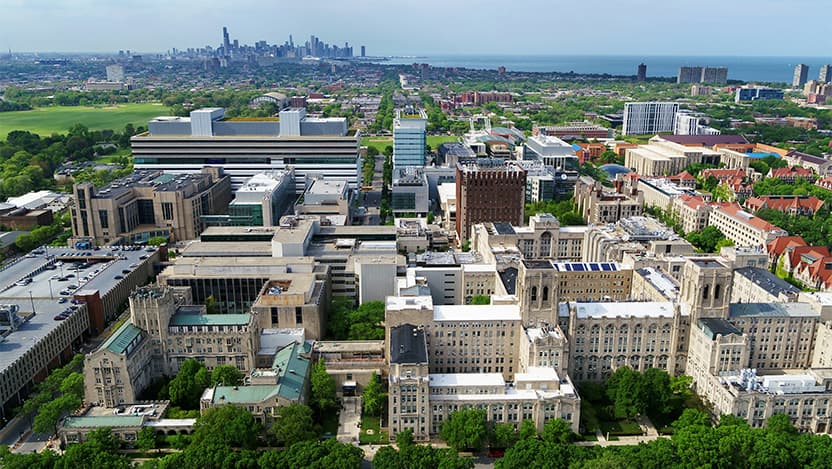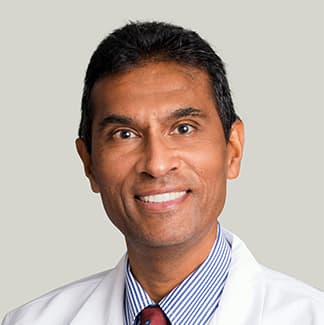New data: UChicago Medicine’s Heart Transplant Program earns country’s highest marks for success

The most recent biannual data from the Scientific Registry of Transplant Recipients (SRTR) show University of Chicago Medicine’s Heart Transplant Program is the best-performing in the country, based on key benchmarks for survival and how quickly patients are able to receive organ transplants.
Only 14 of 143 heart transplant programs in the U.S. earned a top-tier rating from SRTR, an organization contracted by the Valluvan Jeevanandam, MD, Director of the UChicago Medicine Heart and Vascular Center. “It’s a proud moment for everyone who’s made this happen, but it’s even more important for our patients, who are getting the best care in the world.”
Notably, UChicago Medicine’s time-to-transplant measurement stood out when compared to competing heart transplant programs. Based on data compiled by the registry, half of the patients on UChicago Medicine’s waiting list received a new heart in 1.1 months, compared to the national average of 6.9 months. The time to find a new heart for 75% of UChicago Medicine patients on the waiting list was 2.8 months. The next-closest program’s wait time was 12.7 months.
We credit that speed to UChicago Medicine’s aggressiveness in accepting donor hearts that other facilities might choose to forego. Jeevanandam said the multidisciplinary transplant team at the South Side academic health system is able to safely and effectively utilize a wider pool of donor organs because of the group’s extensive experience with difficult and unusual transplant cases.
Transplantation is the ultimate team sport. One cannot have these types of results without being part of an extraordinary team. Our patients live longer and live better because of the dedication and professionalism of this team.
Reflecting the commitment to the community that UChicago Medicine serves, the SRTR data also showed UChicago Medicine had the highest percentage of African American heart transplant patients in the country at 42.2%.
That’s something we can be proud of here on the South Side of Chicago. We’re serving our community and helping overcome major health disparities by transplanting more African American patients.
The UChicago Medicine Heart Transplant Program’s achievement comes as it continues to grow. In fiscal year 2021, the organization performed 62 heart transplants, a nearly 50% increase from the previous year, making it a top eight program by volume in the country. According to Jeevanandam, the volume increase can be attributed to local outreach, new approaches that allow the program to transplant patients not considered transplantable elsewhere, complex patient referrals from other programs, and referrals for bloodless surgery, multi-organ transplant and congenital heart disease.
“We’re taking the sickest patients and giving them the best results,” Jeevanandam said. “We’re transforming people’s lives.”
UChicago Medicine has a long history of transplantation breakthroughs dating back more than 115 years. In 1904, a cardiac surgeon developed the technique for joining severed ends of blood vessels together, a procedure that eventually made organ transplantation possible. The medical center continued advancing the field by pioneering the study of bone marrow transplantation and performing the first successful living-donor liver transplant in the world, first segmental and split-liver transplants in the U.S., and the first pancreas transplant in Illinois. In 2018, its transplant team performed the world’s first back-to-back triple-organ transplants to replace two patients’ failing hearts, livers and kidneys. (The organization has performed 13 of the country’s 25 heart-liver-kidney transplants.) And in 2020, it performed one of the country’s first transplants on a patient who required a new heart because of damage from COVID-19.
Only 14 of 143 heart transplant programs in the U.S. earned a top-tier rating from SRTR, an organization contracted by the Valluvan Jeevanandam, MD, Director of the UChicago Medicine Heart and Vascular Center. “It’s a proud moment for everyone who’s made this happen, but it’s even more important for our patients, who are getting the best care in the world.”
Notably, UChicago Medicine’s time-to-transplant measurement stood out when compared to competing heart transplant programs. Based on data compiled by the registry, half of the patients on UChicago Medicine’s waiting list received a new heart in 1.1 months, compared to the national average of 6.9 months. The time to find a new heart for 75% of UChicago Medicine patients on the waiting list was 2.8 months. The next-closest program’s wait time was 12.7 months.
We credit that speed to UChicago Medicine’s aggressiveness in accepting donor hearts that other facilities might choose to forego. Jeevanandam said the multidisciplinary transplant team at the South Side academic health system is able to safely and effectively utilize a wider pool of donor organs because of the group’s extensive experience with difficult and unusual transplant cases.
Transplantation is the ultimate team sport. One cannot have these types of results without being part of an extraordinary team. Our patients live longer and live better because of the dedication and professionalism of this team.
Reflecting the commitment to the community that UChicago Medicine serves, the SRTR data also showed UChicago Medicine had the highest percentage of African American heart transplant patients in the country at 42.2%.
That’s something we can be proud of here on the South Side of Chicago. We’re serving our community and helping overcome major health disparities by transplanting more African American patients.
The UChicago Medicine Heart Transplant Program’s achievement comes as it continues to grow. In fiscal year 2021, the organization performed 62 heart transplants, a nearly 50% increase from the previous year, making it a top eight program by volume in the country. According to Jeevanandam, the volume increase can be attributed to local outreach, new approaches that allow the program to transplant patients not considered transplantable elsewhere, complex patient referrals from other programs, and referrals for bloodless surgery, multi-organ transplant and congenital heart disease.
“We’re taking the sickest patients and giving them the best results,” Jeevanandam said. “We’re transforming people’s lives.”
UChicago Medicine has a long history of transplantation breakthroughs dating back more than 115 years. In 1904, a cardiac surgeon developed the technique for joining severed ends of blood vessels together, a procedure that eventually made organ transplantation possible. The medical center continued advancing the field by pioneering the study of bone marrow transplantation and performing the first successful living-donor liver transplant in the world, first segmental and split-liver transplants in the U.S., and the first pancreas transplant in Illinois. In 2018, its transplant team performed the world’s first back-to-back triple-organ transplants to replace two patients’ failing hearts, livers and kidneys. (The organization has performed 13 of the country’s 25 heart-liver-kidney transplants.) And in 2020, it performed one of the country’s first transplants on a patient who required a new heart because of damage from COVID-19.

Valluvan Jeevanandam, MD
Dr. Valluvan Jeevanandam specializes in the surgical management of heart failure, and is an expert in high-risk cardiac surgery. He has performed more than 1,000 heart transplants — including the total artificial heart — and countless cardiac surgery procedures.
Learn more about Dr. Jeevanandam
Heart Failure and Transplantation
At the University of Chicago Medicine, we bring the best minds in medicine together to meet the needs of patients facing heart failure and transplant.
Read more about our heart failure expertise